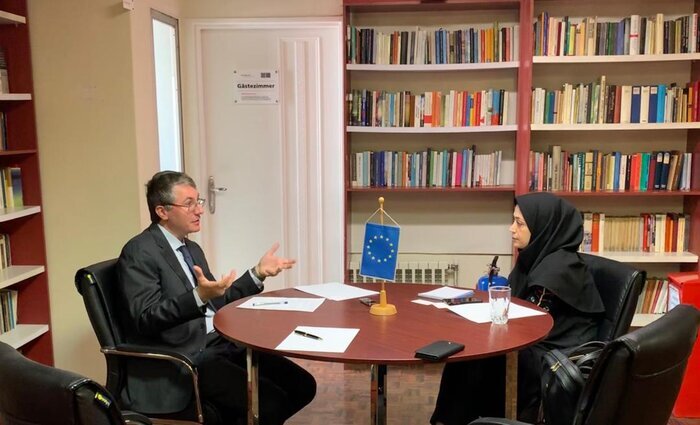The European Union National Institutes for Culture (EUNIC) and Director of Austrian Cultural Forum Alexander Rieger told IRNA in an interview at the Austrian Embassy in Tehran that culture brings the hearts and minds of the people closer together, and that efforts are underway by the EU and Austria in particular, to promote people-to-people diplomacy through cultural exchange.
Referring to the nine-hundred-year-old bilateral relations between Iran and Austria, he says Iran is of a great culture and there have been lots of interactions between Iranian and Austrian people throughout the centuries.
He noted that there are at least 3,500 Iranian volunteers undergo learning German language at the cultural centers every year and that it is one of the most important activities underway in Iran.
Another area of focus of the Austrian embassy is music, he adds. “Since ten years ago, the embassy has supported the Austrian-Iranian Symphonic Orchestra (AISO), the Austrian-Iranian Choir (AIC), children choir. The support also includes holding workshops and inviting music professionals for the young talented Iranians,” Rieger elaborates.
Learning from the Iranian side is also one invaluable dimension of music activities of the Austrian embassy, as the European official believes that the most interesting works are when the Western musical culture meets the Iranian traditional one.
the cultural activities of the Austrian embassy in Tehran, however, are not limited to music, language teaching or holding film weeks. The head of Austrian Cultural Forum in Tehran explains that professional translators with perfect knowledge of both German and Persian are cooperating in converting great literature pieces of the two countries into the two languages to pave the way for the two nations to get acquainted with each other.
“We always want two-way streets of exchange between Austria and Iran,” he says, adding that through cultural exchanges a more correct and realistic picture of Iran, its people and life in the country is reflected.

Complaining of scarcity of Persian language teaching centers in Austria, he calls on the Iranian bodies in charge to boost the centers and resources as he believes that there is not enough activity as it is expected, and language courses have much room to work on.
“Although, we are proud that our Austrian Academy of Sciences has an Institute of Iranian Studies where there are lessons on language, but more focus is on culture and archeology, and it is one of the leading institutes on Iranian studies in Europe,” Rieger notes.
Since twenty-five years ago, Iran and Austria have been holding dialogues of religions, he says when commenting on bilateral cultural ties. He is referring to an event which is held nearly biannually either in Iran or in Austria, and the 8th round of which will be held this year.
The president of EUNIC Iran also raises on the importance of “bringing the people of Iran and those of Europe closer together”, arguing that over the years coming after the nuclear deal many business and political delegations commuted between Tehran and European capitals but the need to people-to-people diplomacy was another dimension of relations.
“Obviously, culture is one of the greatest tools to do that,” he explains.
“When we talk about culture, we are actually talking about cultural and creative industries, we are talking about art, science, education, tourism and cultural heritage.”
He speaks of the cultural connections as a way of contribution to peace since through understanding each other, there would be less misconceptions and hence less conflicts.
Pointing to cultural heritage management, a project the embassy is now involved in Iran, Rieger says that Iran which is one of the richest countries in the world in terms of cultural and archeological sites can enjoy the experience and knowledge of Europe under the project in next five years, and the program will also set the ground for mutual learning of the country and Europe.
Every person that comes to Iran from Europe under the cultural project of EUNIC, and spends a time in the country, gets to know the real Iran, and we believe it is very important, as they are professionals or artists that have wide influence, and are hopefully give this positive image back to their countries, he says.
The official assures that despite the political complexities caused by the latest developments of the nuclear deal, Europe is committed to continue its cultural exchanges with Iran.
“Iran has an unbelievable wealth in culture, and I think it is a very important sector where you can create a lot of value and jobs,” he points out, adding that Austria’s aim is to transfer its knowledge and experience of fostering culture and tourism to Iran as a way of cooperation.
9156**
Follow us on Twitter @IrnaEnglish
IRNA English solhkhabar | Peace International News Agency Peace International News Agency , Peace News , International Agency News of Peace
solhkhabar | Peace International News Agency Peace International News Agency , Peace News , International Agency News of Peace